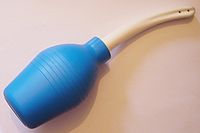Douche: Difference between revisions
Ohnoitsjamie (talk | contribs) m Reverted edits by Elanmiller (talk) to last version by Cbl62 |
No edit summary |
||
| Line 28: | Line 28: | ||
== Slang uses == |
== Slang uses == |
||
'' |
''Douche bag'', or simply ''douche'', is considered to be a [[pejorative]] term. The slang usage of the term originated in the 1960s.<ref>[http://www.drbilllong.com/SpellersDiary/Interlude.html Terms of Derogation]</ref> The term usually refers to a person, usually male, with a variety of negative qualities, specifically [[Hubris|arrogance]] and engaging in obnoxious and/or irritating actions, most often without [[Malice (legal term)|malicious intent]]. |
||
== See also == |
== See also == |
||
Revision as of 09:06, 27 December 2010
 |
 |
A douche (pronounced /ˈduːʃ/) is a device used to introduce a stream of water into the body for medical or hygienic reasons, or the stream of water itself.
Douche usually refers to vaginal irrigation, the rinsing of the vagina, but it can also refer to the rinsing of any body cavity. A douche bag is a piece of equipment for douching—a bag for holding the fluid used in douching. To avoid transferring intestinal bacteria into the vagina, the same bag must not be used for an enema and a vaginal douche.
Etymology
The word douche (Template:IPA-fr) comes from French, where it has the broader meaning of shower. It is thus a "false friend", and the French phrase for vaginal douching is douche vaginale. In American English, the word douche is also used as a derogatory slang term (see slang uses below).
Overview

Vaginal douches may consist of water, water mixed with vinegar, or even antiseptic chemicals. Douching has been touted as having a number of supposed but unproven benefits. In addition to promising to clean the vagina of unwanted odors, it can also be used by women who wish to avoid smearing a sexual partner's penis with menstrual blood while having intercourse during menstruation. In the past, douching was also used after intercourse as a method of birth control, though it is not effective (see below).
Many health care professionals state that douching is dangerous, as it interferes with both the vagina's normal self-cleaning and with the natural bacterial culture of the vagina, and it might spread or introduce infections. For example, the U.S. Department of Health and Human Services strongly discourages douching, warning that it can lead to irritation, bacterial vaginosis, and pelvic inflammatory disease (PID). Frequent douching with water may result in an imbalance of the pH of the vagina, and thus may put women at risk for possible vaginal infections, especially yeast infections.[1]
In May 2003, a randomized, controlled, multi-center study was conducted with 1827 women ages 18–44 who were regular users of a douche product and who had been treated recently for a sexually transmitted bacterial infection or bacterial vaginosis. Women were randomly assigned to use either a newly designed and marketed douche product or a soft cloth towelette. There was little or no indication of a greater risk of PID among women assigned to use the douche product (versus soft cloth towelette). Douching may be related to a lower probability that a woman becomes pregnant.[2]
Antiseptics may also result in an imbalance of the natural bacteria in the vagina, also resulting in an increased likelihood of infection.[3] Furthermore, unclean douching equipment may also introduce undesirable foreign bodies into the vagina. For these reasons, the practice of douching is now strongly discouraged except when ordered by a physician for specific medical reasons.[3] Douching may also wash bacteria into the uterus and Fallopian tubes, causing fertility problems.[4]
Douching after intercourse is estimated to reduce the chances of conception by only 15-25%. In comparison, proper condom use reduces the chance of conception by as much as 97%. In some cases douching may force the ejaculate further into the vagina, increasing the chance of pregnancy. A review of studies by researchers at the University of Rochester Medical Center (N.Y.) showed that women who douched regularly and later became pregnant had higher rates of ectopic pregnancy, infections, and low birth weight infants than women who only douched occasionally or who never douched.[3]
The practice of douching is now largely restricted to the United States, where douching equipment is often available in pharmacies. A 1995 survey quoted in the University of Rochester study found that 27 percent of U.S. women age 15 to 44 douched regularly, but that douching was more common among African-American women (over 50%) than among white women (21%).[3]
Slang uses
Douche bag, or simply douche, is considered to be a pejorative term. The slang usage of the term originated in the 1960s.[5] The term usually refers to a person, usually male, with a variety of negative qualities, specifically arrogance and engaging in obnoxious and/or irritating actions, most often without malicious intent.
See also
References
- ^ WebMD article on the causes of yeast infections, including douching.
- ^ Rothman KJ, Funch DP, Alfredson T, Brady J, Dreyer NA (2003). "Randomized field trial of vaginal douching, pelvic inflammatory disease and pregnancy". Epidemiology. 14 (3): 340–8. doi:10.1097/00001648-200305000-00015. PMID 12859036.
{{cite journal}}: Unknown parameter|month=ignored (help)CS1 maint: multiple names: authors list (link) - ^ a b c d Science News article on the dangers of douching.
- ^ Warning from Kelly Shanahan, MD on douching.
- ^ Terms of Derogation






